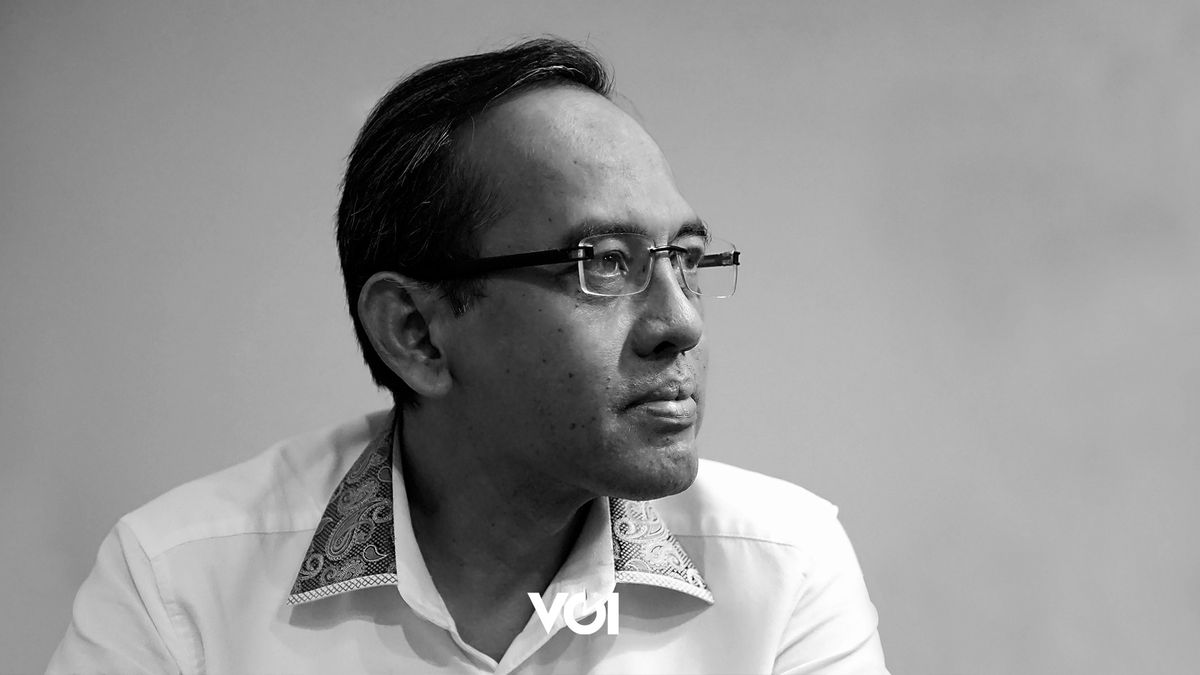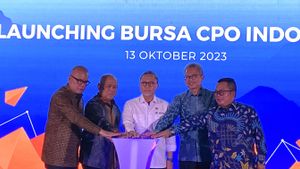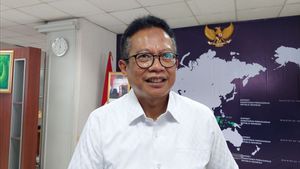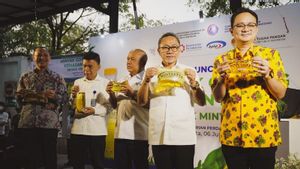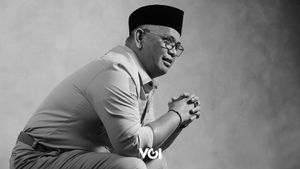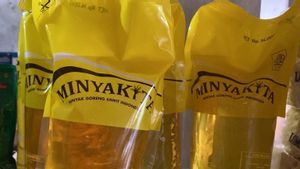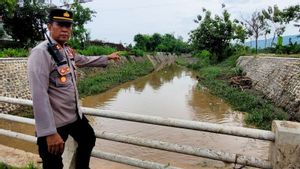Indonesia is the largest producer of CPO (crude palm oil - palm oil) in the world. However, for CPO prices, it still refers to Malaysian Exchange and Rotterdam, Netherlands. After the Indonesian CPO Exchange arrives, it is hoped that the direction of CPO prices will no longer go overseas. To get to that stage, you need a lot of improvement and learning. The key words, said the Managing Director of Inacom KPBN, Rahmanto Amin Jatmiko, are synergy and collaboration.
***
Minister of Trade of the Republic of Indonesia Zulkifli Hasan inaugurated the operation of the Indonesian CPO Exchange on October 13 2023 in Jakarta. With the operation of the CPO Exchange, the operations of which are carried out by PT. It is hoped that the Indonesian Commodity and Derivatives Exchange (ICDX) will be the center of CPO prices, which have previously shifted to Indonesia's exchanges in other countries.
In fact, this is an ideal goal, but to get to that stage requires a serious process and effort so that the trust and credibility are recognized by all business people involved in the CPO trade. And the most important thing is that they want to transact on the Indonesian CPO Exchange. As is the aim of establishing this exchange, it can become a reference not only for business people in Indonesia but also in the world.
Because the Indonesian CPO Exchange has only just been established, according to Rahmanto Amin Jatmiko, there is no need to be embarrassed about learning from neighboring countries which have gone up and down building the CPO exchange to what it is today. Bursa Malaysia has become a reference. “We can learn from Malaysia in building the CPO Exchange. Reflecting on Malaysia, they built the CPO exchange (Bursa Malaysia Derivatives Berhad - BMD) and it didn't happen overnight. And the synergy they create is great. "Previously there were many CPO exchanges, now they have finally merged into one Malaysian Exchange," he said.
When asked about the existence of Inacom KPBN with the presence of the Indonesian CPO Exchange, he said the two were complimentary and could work together. “KPBN does not intersect or compete with the Indonesian CPO Exchange. KPBN and the CPO Exchange can compliment and strengthen each other, and we hope they can work together," he said.
In the future, Rahmanto continued, Inacom KPBN could metamorphose into a national commodity auction market that not only sells existing commodities, but can also sell other commodities produced in Indonesia. And the opportunity is open and very possible.
As a business entity under PT. Perkebunan Nusantara (PTPN), Inacom KPBN continues to improve. In 2019, KPBN was rebranded to Inacom (Indonesia Commodity) KPBN. The goal is for the company to be more dynamic and adaptive to current developments. The commodities sold are still CPO (crude palm oil), PKO (palm kernel oil), PKM (palm kernel meal), rubber, sugar, tea, coffee and molasses).
Apart from talking about the Indonesian CPO Exchange, Rahmanto Amin Jatmiko, he also highlighted the implementation of DMO (Domestic Market Obligation) and DPO (Domestic Price Obligation) which has been happening so far, regarding cooking oil subsidies that are not on target and the hope that Indonesia will become the largest CPO producer in the world. can play a bigger role in determining the price of this commodity. "This is self-criticism, so far synergy among all those involved in the palm oil industry has not been well established," he hoped when met by Edy Suherli, Ary Julianta, and Irfan Medianto from VOI at the Inacom KPBN Office, in the Gondangdia Menteng area, Central Jakarta, not long ago. Here is the full excerpt.

So far, according to the observations of Inacom KPBN Managing Director Rahmanto Amin Jatmiko, the distribution of subsidized cooking oil is still not on target. (Photo; Savic Rabos, DI; Raga Granada)
Inacom KPBN is a marketing institution, what commodities are traded?
Inacom KPBN is a subsidiary of PTPN. Previously it was called KPB (Joint Marketing Office) which was established in 1968. Its function was as a sales facility for PTPN I to PTPN XIV products spread across various regions in Indonesia. In order to avoid price differences for each commodity, KPB was formed. The main commodity; palm oil, rubber, tea and sugar. Previously there was coffee and tobacco. Currently, palm oil contributes around 70 percent of PTPN's total income, followed by sugar, rubber and tea. Over time, KPB changed into a company with the name PT Kharisma Marketing Bersama Nusantara (KPBN) in 2009. And then rebranding was carried out in 2019, the name became Inacom KPBN.
Apart from the 4 traded commodities, what else does Inacom KPBN do?
We have 3 other business lines; stock exchange or auction market, trading and logistics. For other developments, we will enter the national commodity auction market. Currently we are still waiting to get permission from Bappebti (Commodity Futures Trading Supervisory Agency). If the permit is issued, we will become the first commodity auction market in Indonesia. If that is established, we have the opportunity to sell commodities other than those produced by PTPN.
So far, what has the supervision been like during auctions at KPBN?
Because KPBN is a subsidiary of PTPN, the first supervisor is the shareholders through the board of commissioners, which has an audit committee, risk committee and we carry out the governance that has been determined. Then, in carrying out our activities, we are also supervised by the BPK. The government has carried out an audit of the auctions held in us. So there is corporate and regulatory supervision established by most state-owned entities.
Indonesia is the largest CPO exporter in the world, but outsiders still decide the price, why is it like this?
That Indonesia is the largest CPO producer in the world is a fact. We can produce more than 50 million tons of CPO a year. Second place is Malaysia which produces more than 18 million tons. In fact, it is the market that determines the commodity price. And it fluctuates depending on supply and demand. Only many people use benchmarks from Bursa Malaysia or Rotterdam, the Netherlands. Why Bursa Malaysia because there is very large liquidity and transactions. And they have credibility as a CPO exchange.

According to Inacom KPBN Managing Director Rahmanto Amin Jatmiko, the Indonesian CPO Exchange and Inacom KPBN can complement each other in the CPO trading system. (Photo; Savic Rabos, DI; Raga Granada)
What makes a CPO exchange credible?
There are three things that make the CPO Exchange credible. Firstly, price discovery occurs, so the price must be discovered, not determined. The price must come from an agreement between the seller and the buyer. These two exchanges are used as references by business people. And thirdly, there is the future market. In Rotterdam it is similar to what happened in KPBN. The transactions are physical and there is no future market. Therefore, we believe that the prices from KPBN can and are worthy of being a reference. At the end of 2022, our prices will become a reference on Reuters and Bloomberg (published on the Reuters and Bloomberg sites). If asked why the price of CPO is determined by outsiders, it is because their price is the reference.
Regarding the price of CPO in Indonesia, is it purely determined by supply and demand in the market or is it the work of speculators?
From a business perspective, Indonesia hopes that CPO prices will be high, because it generates foreign exchange. In 2021, we can earn more than IDR 500 trillion in foreign exchange from CPO. Taxes and foreign exchange from exports of CPO and its derivative products will go to the state treasury. If the price of CPO is high, the price of cooking oil will also be high, because the main ingredient is CPO. So what's the solution then? The solution is to subsidize the price of cooking oil for the people. Where do the funds come from? This could be from CPO export taxes collected at BPDPKS (Palm Oil Plantation Fund Management Agency).
So the existing CPO production can subsidize poor people, right sir?
Our CPO output is 50 million tons a year. The need for CPO for food is more than 8 million tons, with 5 million tons being cooking oil and more than 3 million tons being non-cooking oil food, such as margarine, shortening and specialty fat.
Of the 5 million tons of cooking oil (migor) needed: industrial migrant needs are around 1.6 million tons, bulk household migrant 2.12 million tons, simple and premium packaged migrant 1.3 million tons. And ideally what is subsidized is migrant for bulk household needs alone, which is around 2.12 million tonnes.
What are your observations regarding the implementation of DMO and DPO in our CPO trading system?
The government has implemented DMO and DPO policies so that the price of cooking oil for less fortunate people is affordable. In practice, the price of Minyakita is set at IDR 14,000 per kilogram. When CPO prices are high, those who provide subsidies are cooking oil producers. In fact, this subsidy practice has a bad effect on behavior, it could be that someone buys cooking oil and then replaces the packaging with a new one and sells it at market price. As a result, Minyakita has become rare. Then the distribution of Minyakita is sometimes not on target, because it is sold freely in supermarkets or general stores. So anyone can buy it even if they are not poor. Are there speculators or not? There could be. That's why the rules must be clear and strict and supervision is also important.
VOIR éGALEMENT:
How do you respond to the recent presence of the CPO Exchange in Indonesia?
In fact, we also want independence in the CPO trading system. We see that the Indonesian CPO Exchange is the beginning of the CPO trading system which will influence the world CPO trading system. We see it as positive, let's work together to create a credible mechanism to make Indonesia credible in the eyes of the world in CPO trading. The exchange is a kind of marketplace or platform or market. The market must attract sellers and buyers, in addition to the market organizer. The market must benefit all parties, not just the market owner or exchange.
After the Indonesian CPO Exchange arrives, what will KPBN's existence be like?
So far, KBPN as an auction market only sells PTPN products, does not sell products from other parties. But our commodities are bought by various parties. The presence of the Indonesian CPO Exchange is a place for private sellers and buyers (non PTPN). The ideal market is many to many, with many buyers and many sellers. KPBN is currently an auction market which can be said to be single to many. Because the KPBN is distributed throughout Indonesia, there are even buyers from abroad. And its nature is physical trading. If you want to be an exchange, it must be a futures market. So KPBN does not intersect or compete with the CPO Exchange. KPBN and the CPO Exchange compliment and strengthen each other, and we hope they can work together.
In the future, is it possible for KPBN to become a CPO Exchange too?
There is always the possibility of that, but we have to look at the mandate given by PTPN to KPBN. It depends on shareholder opinion and agreement. However, if KPBN metamorphoses into a national commodity auction market that does not only sell existing commodities, that is very possible. A deeper study is needed to go there (CPO Exchange).
The hope of many parties is that in the CPO trade, Indonesia, which is the largest producer, can be a determinant, not just a follower. What is your view?
It is not homework for one entity or one institution alone. This is our collective responsibility as a nation. So all related parties must work together, from the government, BUMN, and all the private sector. This is self-criticism, so far synergy among all those involved in the palm oil industry has not been well established. Reflecting on Malaysia, building a CPO exchange did not happen overnight. And the synergy they create is great. Previously there were many CPO exchanges, now they have finally merged into one in the Malaysian Exchange. They voluntarily join and make transactions there. If we want to be like that in building a CPO exchange, the key words are synergy and collaboration of all parties.
Rahmanto Amin Jatmiko, Healthy and Mutual Trust

According to Rahmanto Amin Jatmiko, exercise is important for refreshing and maintaining health. (Photo; Savic Rabos, DI; Raga Granada)
Apart from his busy schedule as Managing Director of Inacom KPBN, Rahmanto Amin Jatmiko carries out various activities. One of them is sport. When exercising there are two sides that he can gain, personal health and establishing communication with relationships. So how does he make time for his family in the midst of his busy schedule? Here's how he aligns it.
Outside of office activities, there are two things that Koko often does, as he was usually called by his friends during school. “My hobbies are sports and reading. The sports I do are running and golf. "By doing this hobby, I can refresh myself from the busyness of the office," said the man who was born in Klaten, Central Java, March 7 1973.
Why choose running as a sport? “I used to have cholesterol up to 400 mg/dL. Even though he hasn't liked sports since high school and college. "But in this situation, I was forced to obey the doctor's instructions so that my cholesterol could go down and my body could be healthier," he said.
Exercise became an option because Koko did not want to take medication to overcome the surplus of cholesterol in his body. "Now, after running regularly, thank God my cholesterol level is approaching 200 mg/dL," said the man who joins a running community called Turn.
Because he often runs, now Koko has the courage to try the half marathon. However, he did not force himself to take part in a marathon if the situation did not allow it. "You have to prepare a lot and be disciplined if you want to take part in a marathon," he continued.
Play Golf

Even though he is busy with activities at the office, Rahmanto Amin Jatmiko makes time for his family. (Photo; Savic Rabos, DI; Raga Granada)
Many executives choose the sport of golf because there are many things that can be used when playing with friends. Koko has his own reasons why he also pursues this sport.
So it's not just talkative or just for style to be seen as classy by your relations. On the golf course, many complicated problems can be resolved and resolved. "By playing golf we can talk about anything unpleasant in a comfortable place," said the man who had a career in a multinational company before landing at Inacom KPBN.
What makes it delicious is that the view from one golf course to another is different. “If we play tennis, what city does it have like that? No golf course is the same. "Because each golf course has its own uniqueness, the views are different," he said.
By playing golf, Koko gets two things, firstly health due to exercise and secondly problem solving. He can solve problems that might be difficult to resolve in the office with this and that meeting.
Mutual Trust

Even though he is busy with a multitude of activities, Rahmanto Amin Jatmiko is committed to making time for his family, his beloved wife; Rossi Aprilianti and their two grown children; Ryan and Rafina.
“Every weekend I always make time to gather with my children and wife. "And also when the children are on school holidays, I also make time to hang out with them," he said.
Koko was lucky because he was already in a relationship with Rossi when he studied at the same high school in Klaten. "I've known him since high school. When I was studying in Bandung, he was in Jakarta, then my first job was in Surabaya. "When I moved to work in Jakarta, we just got married," recalled the man who completed his studies at ITB (Industrial Engineering), then continued his studies at NTU Nanyang Business School (MBA) Singapore and MIT Sloan School of Management (International Advance Management Program) USA.
One other tip for maintaining relationships with those closest to you is to maintain trust. “This is for families and also in the work environment. What we say is not lip service. "If we maintain trust, friendships and any relationship will last," said Koko, who is anti-imagery.
“Trust cannot be built with image. Trust will be built from the consistency of what we do," concluded Rahmanto Amin Jatmiko.
"So far, the synergy of all those involved in the palm oil industry has not been well established. Reflecting on Malaysia, they built a CPO exchange which did not happen overnight. And the synergy they implemented was very good. Previously there were many CPO exchanges, but now they have finally merged into one in "Bursa Malaysia. They voluntarily join and transact there. If we want to be like that in building a CPO exchange, the keywords are synergy and collaboration,"
The English, Chinese, Japanese, Arabic, and French versions are automatically generated by the AI. So there may still be inaccuracies in translating, please always see Indonesian as our main language. (system supported by DigitalSiber.id)
